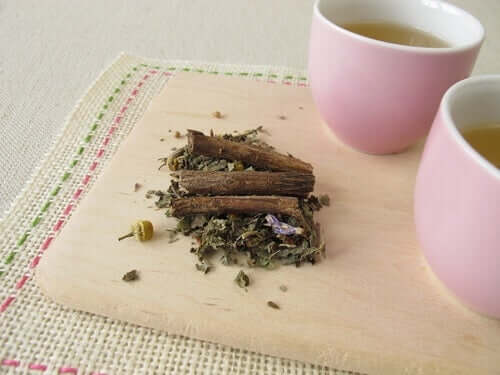Hiatal hernia: causes and natural remedies for it


Reviewed and approved by the doctor José Gerardo Rosciano Paganelli
If you’ve been diagnosed with a hiatal hernia, you should know that you need to improve your lifestyle as soon as possible. Additionally, you’ll need to follow the treatment guidelines indicated by your doctor.
Hiatal hernias produce different symptoms that are quite annoying. These include heartburn, difficulty with swallowing, nausea, vomiting with blood or dark-colored stools, acid reflux, and more. All of these symptoms affect a patient’s quality of life.
Below, we will tell you more about this disease and what the treatment prescribed by doctors includes. Furthermore, we will indicate some of the home remedies that are commonly recommended.
What is a hiatal hernia and what are the symptoms?
A hiatal hernia is an anomaly that occurs when part of the stomach becomes displaced above the diaphragm. Stomach acid can rise up the esophagus more easily as a result, which means it’s often confused with gastric reflux. However, having reflux regularly is not necessarily a sign of this condition.
A hiatal hernia is quite a common condition and is mainly found in people over the age of 50 years old. It is said that a large percentage of the population has this condition, although many don’t show any symptoms.
Symptoms
The most common symptoms of a hiatal hernia include:
- Bad breath.
- Flatulence.
- Dark stool.
- Chest pain.
- Vomiting blood.
- Difficulty swallowing.
- Heartburn or a burning sensation in the stomach.
Some people with this condition remain asymptomatic, so it becomes more difficult to diagnose. In addition, vomiting and dark stools appear only in severe cases of hiatal hernia.
Possible causes
- Obesity.
- Smoking.
- A weak diaphragm.
- Increased abdominal pressure when coughing, vomiting or going to the toilet.
Treatment for a hiatal hernia
According to Mayo Clinic experts, most asymptomatic hiatal hernia patients don’t need treatment. However, those with symptoms maybe need to take certain medications. Surgery is usually reserved for the most severe cases.
Some of the medications your doctor may prescribe include antacids, medications to decrease acid production, or medications that block acid production and heal the esophagus.
Additional recommendations
- Give up smoking.
- Keep a healthy weight.
- Don’t eat large meals but rather several smaller meals a day (5–6 in moderate quantities).
- Avoid drinking caffeinated beverages and alcohol.
- Avoid greasy foods, sauces, chocolate, and other potentially irritating foods.
- Eat a light dinner at least 2 or 3 hours before going to sleep at night.
- Don’t lie down after eating. Sit for 15–20 minutes.
Discover: Discover How the Harvard Eating Plate Can Improve Your Diet
Natural remedies to treat hiatal hernias
According to folk wisdom, the following remedies can help relieve discomfort in the event of a hiatal hernia. It should be noted that it’s advisable to consult with your doctor before consuming any of these remedies in order to avoid interactions with medication or adverse reactions.
Licorice infusion

Since licorice has antispasmodic and anti-inflammatory properties, it’s said that its infusion can be a good remedy for a hiatal hernia.
Ingredients
- 1 teaspoon of licorice root (5 g).
- 1 cup of water (250 ml).
- Honey (to taste).
Preparation
- Boil the licorice root in the water for about 10 minutes.
- Let it rest for 10 minutes more and then strain. Sweeten the tea with some honey and enjoy.
Apple cider vinegar
According to popular belief, apple cider vinegar is another natural remedy that can help relieve discomfort if you have a hiatal hernia. To take advantage of it, it must always be diluted in a good amount of water.
Ingredients
- 1 teaspoon of apple cider vinegar (5 ml).
- 1 glass of water (250 ml).
Preparation
- Add the apple cider vinegar to the water.
- Mix well and drink.
Chamomile infusion

A chamomile infusion is a very popular remedy that’s used to relieve various discomforts, from menstrual cramps to restlessness. This is because chamomile has anti-inflammatory, analgesic, and sedative properties that are helpful in providing relief.
Ingredients
- 2 tablespoons of dry chamomile flowers (30 g).
- 1 cup of water (250 ml).
Preparation
- Boil the water for a few minutes.
- Then, add the water and the chamomile in a mug.
- Let it rest for a few minutes and then drink.
Aloe vera juice
Aloe vera juice is a popular remedy for the discomfort caused by a hiatal hernia. It should, however, be used with great caution as aloe vera isn’t always tolerated well and can also cause diarrhea and other adverse effects.
Ingredients
- 1 small slice of aloe vera (2–3 g).
- 1 glass of citric fruit juice of your preference (200 ml)
- Honey (to taste)
Preparation
- First, cut off a leaf of aloe vera and let it drain for a few minutes so that the yellowish secretion drains out. This secretion would make the drink bitter and can cause diarrhea.
- Wash and then peel it carefully
- Then, add the aloe and water together in a blender and process.
- Sweeten with honey to taste.
Bay leaf infusion

Bay leaf infusion is another remedy that’s reported to alleviate some of the discomfort caused by a hiatal hernia. Specifically, it treats colics and flatulence.
Ingredients
- 2 bay leaves.
- 1 cup of water (250 ml).
Preparation
- Heat the water and once it reaches a boil, add the two bay leaves and leave to rest.
- Then, strain the infusion and drink.
- Avoid drinking more than 2–3 cups of this in a day.
How to get hiatal hernia improvement?
To improve your condition, the most appropriate thing is that you follow your doctor’s instructions and at the same time try to maintain healthy lifestyle habits. This is especially important when it comes to your diet. Although, remember that if you’re a smoker, it’s best to quit tobacco use in order to not worsen your condition.
Do make sure to consult with your doctor before consuming any of these remedies. This way, you’ll avoid any adverse reactions and drug interactions.
All cited sources were thoroughly reviewed by our team to ensure their quality, reliability, currency, and validity. The bibliography of this article was considered reliable and of academic or scientific accuracy.
- Roman, S., & Kahrilas, P. J. (2013). Hiatal hernia. In Principles of Deglutition: A Multidisciplinary Text for Swallowing and its Disorders. https://doi.org/10.1007/978-1-4614-3794-9_51
- Hyun, J. J., & Bak, Y. T. (2011). Clinical significance of hiatal hernia. Gut and Liver. https://doi.org/10.5009/gnl.2011.5.3.267
This text is provided for informational purposes only and does not replace consultation with a professional. If in doubt, consult your specialist.








